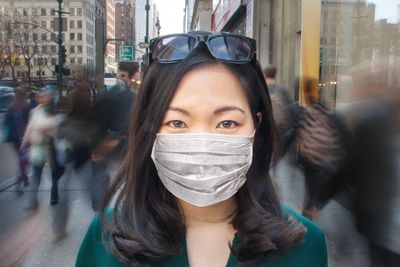Just weeks after revelers made headlines by ignoring social distancing guidelines and crowding into a pool at the Lake of the Ozarks, Natalie Hayden and her family visited the popular Missouri vacation spot.
"My husband's been going to the Ozarks since he was a baby and that's been our place, so it's ironic that it made headlines Memorial Day weekend," Hayden said, adding that she and her husband took their three-year-old son and 18-month-old daughter to visit her in-laws just a couple weeks later.
"They have a condo off the beaten path," Hayden explained. "We cooked all our meals at the condo and went out in the boat. It was a great way to change up the scenery and get out of our house."
It wasn't an easy decision for Hayden because she has Crohn's disease, and the medication she takes makes her immunocompromised.
Those who are immunocompromised have a weakened immune system and are more susceptible to infections, including COVID-19. They're also more likely to have severe symptoms and/or complications from the disease.
Minimizing risk: Outdoor activities are safer than indoor activities
With many states reopening even as other states are seeing record numbers of COVID-19 infections and deaths, I wanted to learn more about the risk to immunocompromised people and how they should approach reentering the world. I reached out to Dr. Anca Askanase, associate professor of medicine and director and founder of the New York-Presbyterian's Columbia Lupus Center, for some answers.
"It makes perfect sense to consider these people at risk because they're at risk for everything else. But how that plays out in this pandemic, I don't think we have the information or numbers to back us up," Askanase said, adding that the magnitude of the risk is not understood yet.
She said that the experience of the pandemic has been so varied across the country that it's hard to make a prediction about how immunocompromised people should open back up to the world. She emphasized that our ability to treat or prevent the disease hasn't changed, and immunocompromised people are still at risk. So looking at local data, like how prevalent the virus is in their area, should dictate their response.
"It's a balance between the individual's level of comfort and the extent of the immune suppression...," Askanase said. "The best advice we should give people is to talk to the physician taking care of that particular immune condition and get a good sense of the pros and cons in terms of starting to go out and how that might look."
In her own practice, Askanase said she'd been telling her lower risk patients they can go out if they practice social distancing and always wear a mask.
"If it feels that a situation is becoming too crowded or there are too many people, I think removing oneself from that situation is the correct step," Askanase tells her patients.
Askanase said those who are immunocompromised should go outside and enjoy the summer weather, adding that seeing family and friends (while distancing) can be therapeutic. However, she strongly warned against indoor exposures, which she said are infinitely more risky than being outdoors. She added that she thinks most people have a grasp of what's safe and what's unsafe by now.
"If something doesn't feel safe, it probably isn't," Askanase said.
In areas where people aren't as diligent about wearing a mask and numbers are rising, she said being on alert may be the correct thing to do. "Your risk/benefit ratio may be higher on the risk side," Askanase said.
She also reminded those taking immunosuppressants to treat conditions (such as Crohn's, rheumatoid arthritis and lupus) to continue taking their medication.
"I have noted a lot of flares of autoimmune diseases because people got very nervous to take immunosuppressants in the middle of the bad days of the pandemic," Askanase said. "Now may be a good time to do a medical checkup to ensure that some of the lapses have not resulted in an increased risk."
Calculating a new normal
When I first communicated with Hayden in the early days of the pandemic back in March, she told me she wasn't leaving the house and was washing her hands around the clock.
Months in isolation have been hard on her family, particularly her young son.
"It's been challenging and complicated because my son's a little over three and he's hard to entertain, and we feel guilty that he's not getting to play with his friends," said Hayden, who documents her health journey on her blog, Lights Camera Crohn's. "Especially as things reopen and people expand their bubble and have playdates. It's just too risky. I always think about it as a calculated risk and you have to think about it as, Who are these kids seeing? Who are their parents seeing? Are their parents back at work? Are their older siblings babysitting? When I start thinking about all the little touch points of their reality compared to ours, I think, that's too risky."
Despite her state reopening, Hayden is still being extremely cautious. Since March, she's only gone into an enclosed space three times. When her husband returns from work or shopping, he immediately puts his clothes in the washer and takes a shower. She still struggles with getting her children outside though.
"We've tried to go to parks and we have to turn around and go to a different one and still can't get out of the car because we see all the masses of people. Even though it's outdoors, it still feels too risky to us.
"I'm hopeful for the day when we feel comfortable getting out and about outdoors and we'll be able to visit a public park," Hayden said.
Aren't we all?


